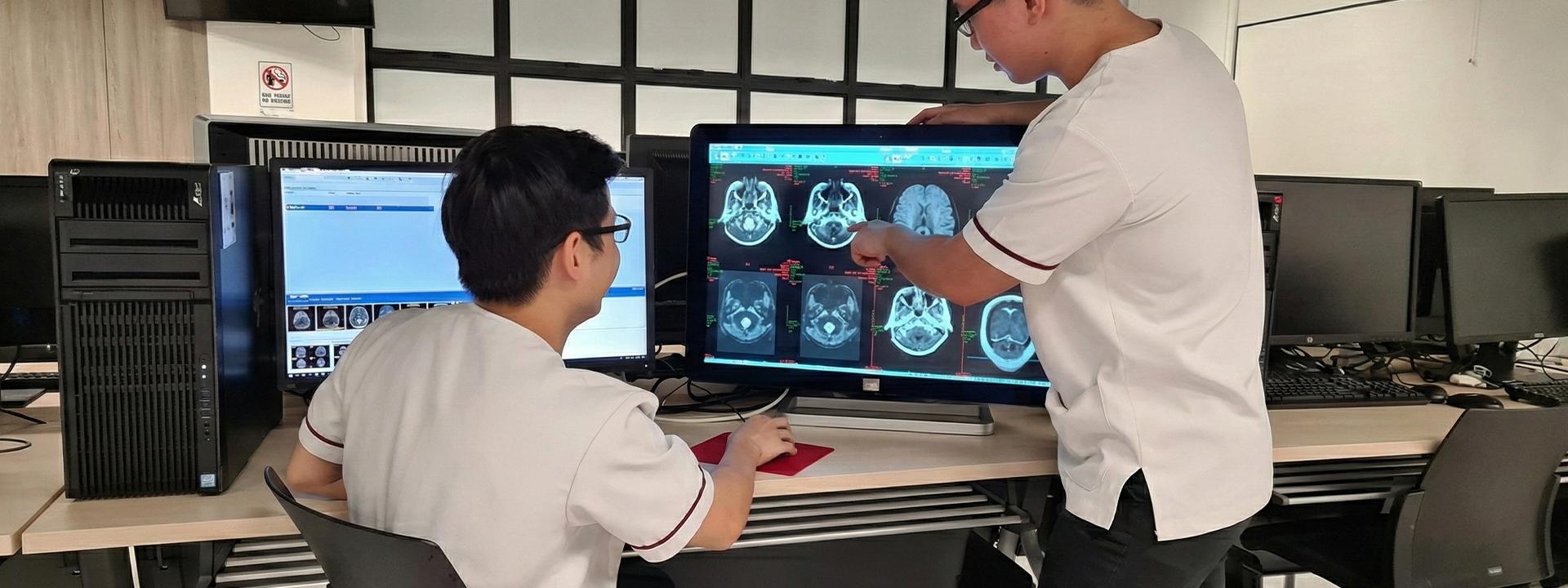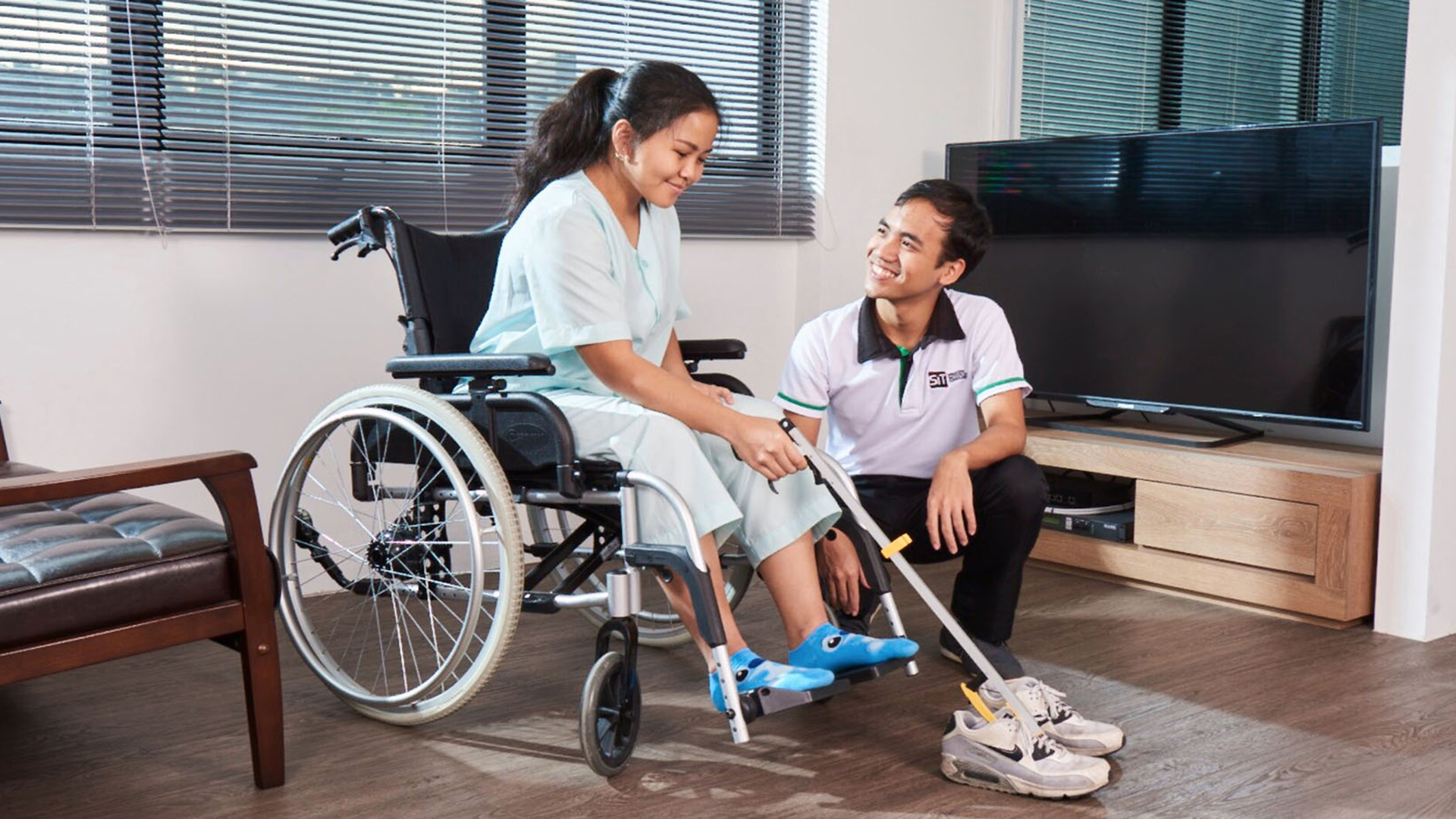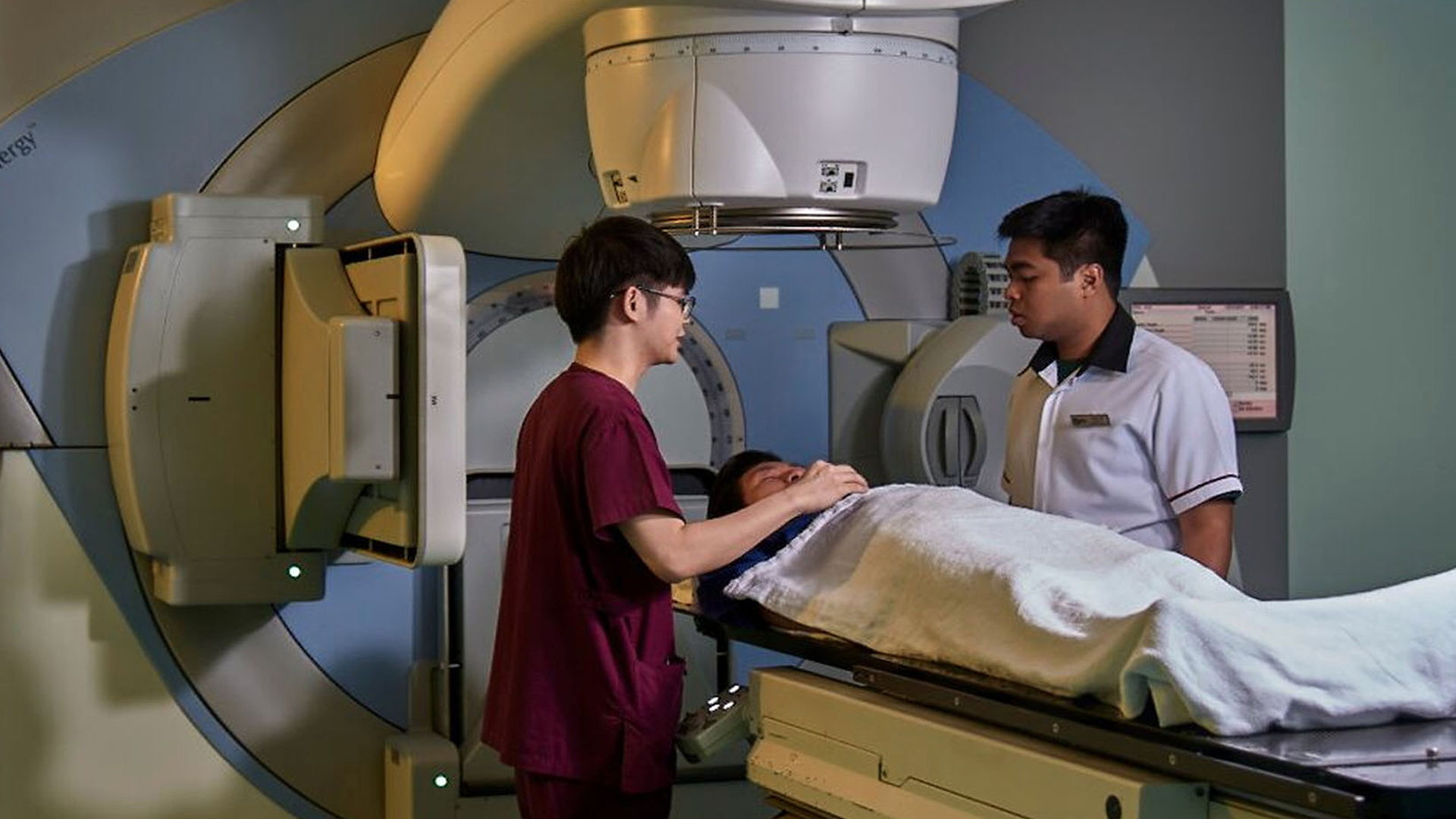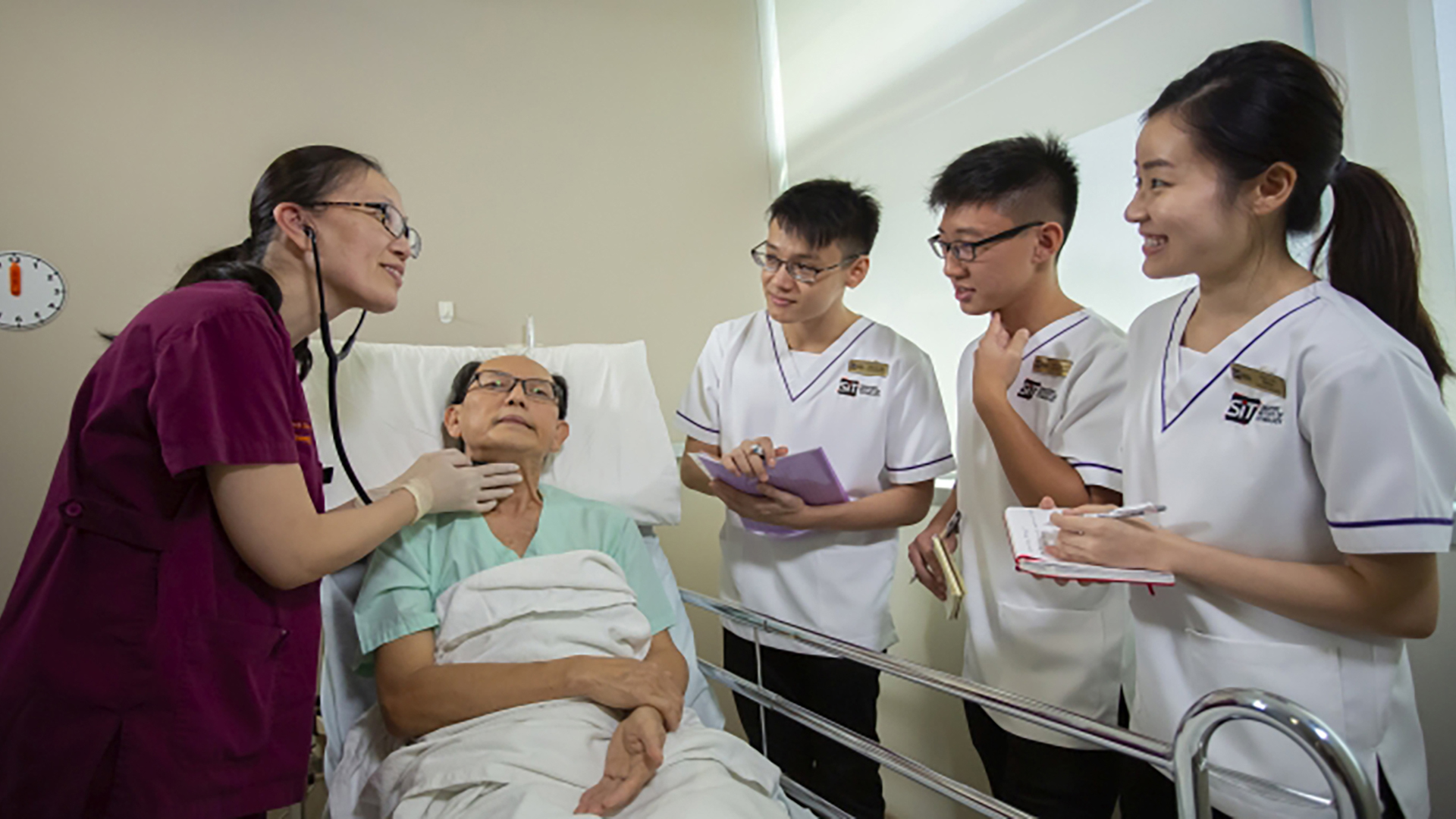![[FA] SIT One SITizen Alumni Initiative_Web banner_1244px x 688px.jpg](/openhouse2025/sit-teaching-and-learning-academy/centre-professional-communication/centre-professional-communication/openhouse/sites/default/files/2024-12/%5BFA%5D%20%20SIT%20One%20SITizen%20Alumni%20Initiative_Web%20banner_1244px%20x%20688px.jpg)
Programme Overview
The Bachelor of Science with Honours in Diagnostic Radiography is a four-year, direct honours programme that prepares graduates for the role of a professional Diagnostic Radiographer. It is the only programme among autonomous universities in Singapore.
The curriculum is developed in close consultation with the radiography industry to ensure relevance and graduates’ employability. The programme is accredited by the Allied Health Professions Council, thus enabling graduates to practise as registered professional radiographers in Singapore.
Diagnostic radiography involves the use of sophisticated equipment and techniques to produce medical images of the human body. These images are typically used to diagnose or treat illness or injury. Diagnostic radiographers are integral to healthcare teams. They use their professional training to deliver a sensitive and patient-centred healthcare service. The equipment that radiographers use includes X-ray, ultrasound, computed tomography (CT) and magnetic resonance imaging (MRI). Other more specialised settings in which radiographers may work in include fluoroscopy, mammography, nuclear medicine, bone mineral densitometry and interventional radiology. Besides caring for patients, radiographers are also actively involved in other areas of healthcare such as research, education and administration.
Do note that the healthcare staff guidelines and requirements that apply to healthcare institutions also apply to Health Sciences students. Non-compliance with these guidelines may affect your ability in meeting course requirements, graduating, obtaining registration or employment, and fulfilling bond obligations. It is crucial to adhere to these guidelines to ensure successful completion of your studies and future professional opportunities in the healthcare field.
Curriculum
The SIT Diagnostic Radiography program focuses on applied learning and provides high-quality, practice-oriented education in the following areas:
- Health and behavioural sciences. Broad-based knowledge in health and behavioural sciences, including anatomy, physiology, patient management in healthcare, psychology, health systems, professionalism, and interprofessional education.
- Radiological science and technology. Professional knowledge in radiological science and technology, including radiation physics, radiobiology, radiation protection, radiological anatomy, radiological informatics, image interpretation and AI in medical imaging.
- Radiography practice. Professional knowledge in different areas of radiography practice, including general radiography, fluoroscopy, angiography, CT, MRI, ultrasound, breast imaging, nuclear medicine and hybrid imaging. This component also includes an undergraduate honours thesis that emphasises scientific enquiry and evidence-informed radiography practice.
Clinical Practice Education
All Diagnostic Radiography students need to undergo at least 1000 hours of clinical practice education (CPE) across various clinical settings. Such clinical placements prepare students for the real-world clinical practice and to use various imaging modalities under supervision. Therefore, students get to apply theoretical and clinical knowledge and build up their confidence in clinical skills. Students need to pass all clinical placements to graduate from the programme and to be registered under the Allied Health Professions Council (AHPC).
Students may be eligible for an exit award "Bachelor of Science in Care Sciences" if they fail to meet clinical practice education module requirements for the award of an honours degree, subject to fulfilling conditions for the exit award.
Career Conversion Programme
(formerly known as Professional Conversion Programme)
The Career Conversion Programme (CCP) helps and supports mid-career Singaporeans in acquiring relevant training to be Diagnostic Radiographers. CCP applicants must apply to both SIT as well as WSG during the application period in order to be considered.
| CCP | Degree Programme | CANDIDATURE | Tuition Fees |
|---|---|---|---|
| Diagnostic Radiographers | BSc Diagnostic Radiography | Full Time – 4 years | Subsidised fees for Singapore Citizens, Permanent Residents and International Students are located in Tuition Fees. |
For more information on CCP eligibility, process and funding, please visit WSG CCP for Allied Health Professionals.
Career Options
Suitably qualified radiographers are in high demand in Singapore. Graduates can be employed as diagnostic radiographers in a variety of settings, such as:
- Public and Private Hospitals
- Private Clinics
- Medical Centres
Programme Structure (AY2026/27)*
Programme Structure (AY2025/26)
| Module Title | Credits |
|---|---|
| Anatomy and Physiology 1 | 6 |
| Health Systems - Singapore's Perspectives | 6 |
| Psychological and Sociological Perspectives for Health Sciences | 6 |
| Patient Management in Healthcare | 6 |
| Anatomy and Physiology 2 | 6 |
| Principles of Medical Radiation Science | 12 |
| Healthcare and Radiological Informatics | 6 |
| General Radiographic Practice 1 | 12 |
| Radiobiology and Radiation Protection | 6 |
| General Radiographic Practice 2 | 12 |
| Health Research Methods | 6 |
| Radiological and Cross-Sectional Anatomy | 6 |
| Radiographic Practice in Specialised Settings | 12 |
| CT and MRI | 12 |
| Pathophysiology and Pharmacology | 6 |
| Professionalism, Ethics and the Law | 6 |
| Sonography | 6 |
| Honours Thesis Proposal | 2 |
| Fluoroscopic and Angiographic Practice | 12 |
| Nuclear Medicine and Hybrid Imaging | 6 |
| Artificial Intelligence in Medical Imaging | 6 |
| Image Interpretation | 12 |
| Global Health | 3 |
| Clinical Practice Education 1 | 6 |
| Clinical Practice Education 2 | 12 |
| Clinical Practice Education 3 | 6 |
| Clinical Practice Education 4 | 6 |
| Honours Thesis | 16 |
* The programme structure is subject to change without prior notice. SIT regularly reviews its curriculum to ensure that it remains industry-relevant and prepares our students for the evolving needs of industry.
Eligibility and Exemption
SIT selects candidates for this programme using an aptitude-based approach that considers passion and suitability for the profession, academic achievement and co-curricular involvement. Shortlisted candidates will be invited for the Health Sciences Admission Exercise, which consists of an interview and an essay if required.
Listed below are the relevant admission criteria:
A Levels
Obtained a good pass in two of the following H2 subjects: Biology, Chemistry, Physics and Mathematics, and also offered General Paper or Knowledge & Inquiry in the same sitting while satisfying Mother Tongue requirements.
Polytechnic Diplomas
- Completed a relevant local polytechnic Diploma; and/or
- Acquired relevant full-time work experience of one to two years
Note
- Diplomas that are not listed may be considered on a case-by-case basis.
- Module exemptions will be considered on a case-by-case basis.
International Baccalaureate
Obtained a good pass in two of the following HL subjects: Biology, Chemistry, Physics and Mathematics; while satisfying Mother Tongue requirements.
Other Local Diplomas
NUS High School Diploma Prerequisites
Obtained a good pass in two of the following subjects: Biology, Chemistry, Physics and Mathematics.
Other equivalent Year 12 qualifications are considered on a case-by-case basis.
Mandatory English Requirement
Applicants to the Allied Health Programmes are required to fulfil ONE of the following English requirements by application closing:
| Qualification | English Subject | Minimum Grade Required |
| GCE O Level | English as First Language | C6 |
| IELTS (Academic Module) | IELTS | 6.0 for all components (Listening, Reading, Writing AND Speaking) |
| TOEFL | TOEFL | At least 60 marks for internet-based test |
| OET | OET | Grade B and above |
| Polytechnic Foundation Programme (PFP) | English Modules | C+ |
| GCE A Level | General Paper/Knowledge & Inquiry | D |
| International Baccalaureate (IB) | SL ‘English A: Language & Literature’ OR SL ‘Literature & Performance’ | 4 |
| NUS High School Diploma | EL4101 or higher (EL5101, 6103) modules | C+ |
The Allied Health Professions Council (AHPC) mandates the minimum English language proficiency (ELP) requirements for the Allied Health programmes to enable our graduates to practise in the respective Allied Health professions.
Applicants who hold a first degree from Singapore, Australia, Canada (except Quebec), New Zealand, Republic of Ireland, South Africa, United Kingdom, and the United States of America will be deemed to have fulfilled the stipulated English Language requirement for the programme.
Please refer to the Mandatory Medical Clearance for additional requirements.
Degree Conversion
Applicants with a Diploma in Diagnostic Radiography from Nanyang Polytechnic accepted in the BSc (Hons) Diagnostic Radiography programme will be offered a degree conversion route after matriculation.
The final intake of the degree conversion route will be in Academic Year 2026.
Fees and Finances
Singapore Citizen
Permanent Resident
International Student
Industry Advisory Committee
The members of the Industry Advisory Committee for this programme are:
Head and Senior Consultant, Division of Rehabilitation Medicine, Department of Medicine, National University Hospital and Alexandra Hospital
Group Director, Sector Capability & Transformation Group, National Council of Social Service
Deputy Chief Allied Health Officer, Director-General of Health’s Office, Chief Allied Health Officer’s Office, Ministry of Health
Group Director, Allied Health, National University Health System
Executive Director, NHG Cares Services (Allied Health) and Deputy Group Chief Allied Health, National Healthcare Group
Group Chief Nurse, National Healthcare Group
Group Director, Group Allied Health, SingHealth
Department of Rehabilitation Medicine
Singapore General Hospital
Director, Allied Health, Woodlands Health
Chief Executive Officer, SPD





















